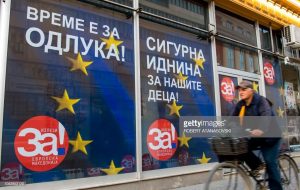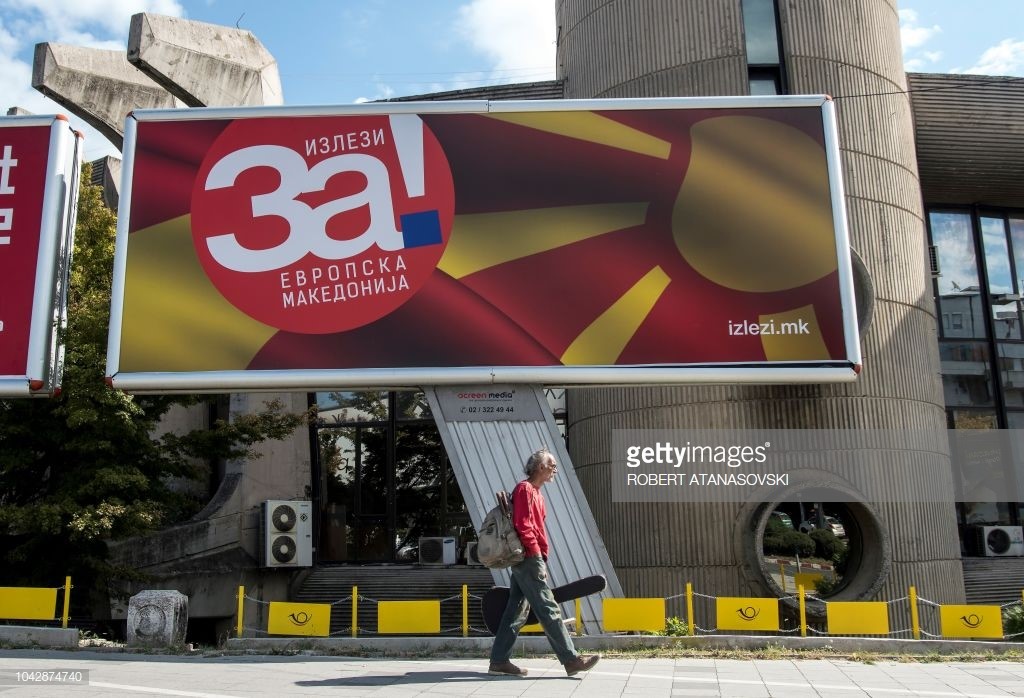by Liridona Veliu, PhD Student, School of Law and Government, DCU
The name dispute: The end of a 27-year-long quarrel
Macedonia is changing its name. Since its independence after the dissolution of Yugoslavia in 1991, Greece has refused to recognize Macedonia’s constitutional name demanding that its northern neighbor modify its name so as to prevent irredentist ambitions to the ancient Hellenic region in northern Greece named Macedonia. With the Republic of Macedonia refusing to abide by such an ultimatum, this has led to Greece blocking the country from entering accession talks with NATO and the EU. The Former Yugoslav Republic of Macedonia (FYROM) would be used by international organizations and states which do not recognize the constitutional name Republic of Macedonia until an alternative was to be found.
On 12 June 2018 in a meeting between the Greek prime minister Alexis Tsipras and his Macedonian counterpart Zoran Zaev, the Prespa Agreement was reached which would result in the Republic of Macedonia being renamed the Republic of North Macedonia. The name-change is an effort to surmount a 20th-century dispute which rose to the highest level of international mediation involving the UN and the International Court of Justice. The deal makes references to crucial identity markers of the country which extend beyond the change of name to involve explicit clarifications that the citizens and the history of the country are from a Slavic origin not related to the ancient Macedonians. The citizens of the Republic of Macedonia voted on these changes in a referendum held on 30th September 2018.
After referendum: Internal controversies and international support

Copyright [2018] by Robert Atanasovski. Reprinted [or Adapted] with permission.
Despite these controversies, a total of 80 deputies in the 120-seat Macedonian parliament voted in favor of the agreement. The two-thirds majority was the minimum needed to start the process of renaming the country. While the agreement remains several steps away from enacting the constitutional changes, leaders from the United States and Europe applauded the breakthrough. NATO Secretary General, Jens Stoltenberg; EU foreign affairs chief, Federica Mogherini, and commissioner, Johannes Hahn; the President of the European Council, Donald Tusk; the Chancellor of Austria, Sebastian Kurz; the German Chancellor, Angela Merkel, and the Minister of State for Europe at the German Federal Foreign Office, Michael Roth, showed their support for the agreement and the referendum as historic achievements to pave the way for a “… common European future”.
(Beyond) the Balkans: Post-Balkanization

Copyright [2018] by Robert Atanasovski. Reprinted [or Adapted] with permission
The problem is deeper. The change of name has been used interchangeably with integration into the EU and NATO as strategic goals, while under the shadow of the recent events, domestic priorities waiting to be addressed such as migration on the rise and ethnic tensions, are left out of treatment. Discussions have externalized as much as internalized in a confusing manner the agency for change i.e. the fate of Macedonia is in the hands of its citizens only, while at the same time being subject to the prosperity and affluence that only membership of the EU and NATO can bring. While Macedonia runs from an encounter with its Balkan self as Europe’s other, renaming the country provides with the escape route. “Macedonia – Europe or eternal Balkans” writes Кица Колбе, depicting the current situation in Macedonia as a chance for the barbaric Balkans to mutate into a subject of European self-awareness.
As the Euro-Atlantic integrations processes of the Western Balkans continue to be underpinned by the dominant logic of the Balkans as a fragmented and problematic island within Europe (i.e. balkanization), the change of name is the golden ticket to an era of post-balkanization. With the rising influence of Russia, Turkey, Saudi Arabia and China in the region, the EU and NATO seem suddenly in a rush to take Macedonia under their wings. Besides discussions of whether such an endeavor would prove as beneficial, a question left unattended is what does walking along the EU and NATO path entail, especially after the country becomes a member of the two. So, what’s in a name? Quite a bit for one to change it, but not enough for one to run away from oneself.


